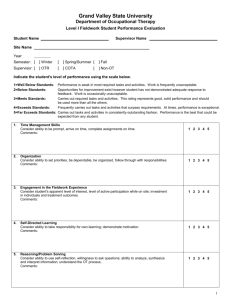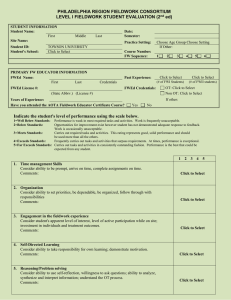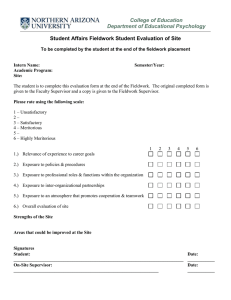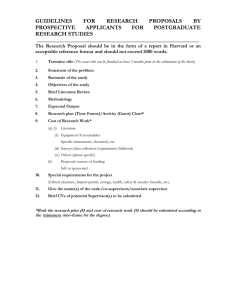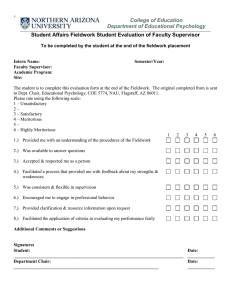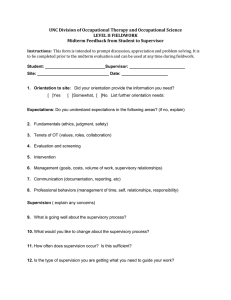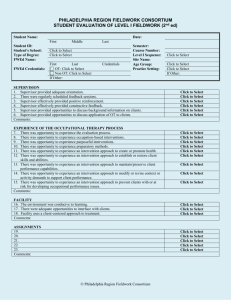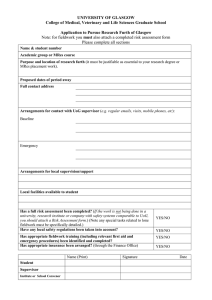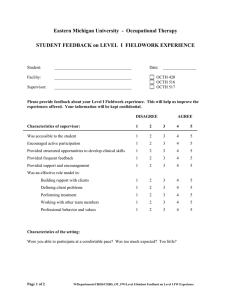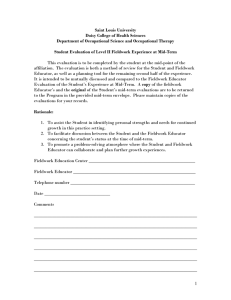PHILADELPHIA REGION FIELDWORK CONSORTIUM LEVEL I FIELDWORK STUDENT EVALUATION (2 ed)
advertisement
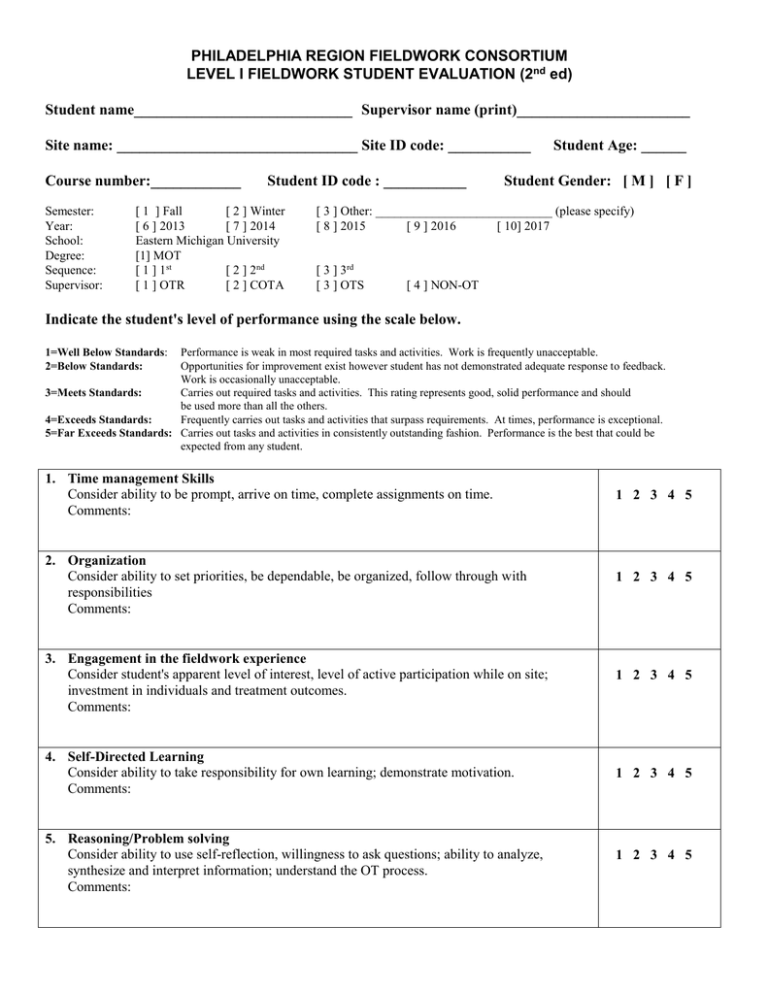
PHILADELPHIA REGION FIELDWORK CONSORTIUM LEVEL I FIELDWORK STUDENT EVALUATION (2nd ed) Student name_____________________________ Supervisor name (print)_______________________ Site name: ________________________________ Site ID code: ___________ Course number:____________ Semester: Year: School: Degree: Sequence: Supervisor: Student ID code : ___________ [ 1 ] Fall [ 2 ] Winter [ 6 ] 2013 [ 7 ] 2014 Eastern Michigan University [1] MOT [ 1 ] 1st [ 2 ] 2nd [ 1 ] OTR [ 2 ] COTA Student Age: ______ Student Gender: [ M ] [ F ] [ 3 ] Other: ____________________________ (please specify) [ 8 ] 2015 [ 9 ] 2016 [ 10] 2017 [ 3 ] 3rd [ 3 ] OTS [ 4 ] NON-OT Indicate the student's level of performance using the scale below. 1=Well Below Standards: 2=Below Standards: Performance is weak in most required tasks and activities. Work is frequently unacceptable. Opportunities for improvement exist however student has not demonstrated adequate response to feedback. Work is occasionally unacceptable. 3=Meets Standards: Carries out required tasks and activities. This rating represents good, solid performance and should be used more than all the others. 4=Exceeds Standards: Frequently carries out tasks and activities that surpass requirements. At times, performance is exceptional. 5=Far Exceeds Standards: Carries out tasks and activities in consistently outstanding fashion. Performance is the best that could be expected from any student. 1. Time management Skills Consider ability to be prompt, arrive on time, complete assignments on time. Comments: 2. Organization Consider ability to set priorities, be dependable, be organized, follow through with responsibilities Comments: 3. Engagement in the fieldwork experience Consider student's apparent level of interest, level of active participation while on site; investment in individuals and treatment outcomes. Comments: 4. Self-Directed Learning Consider ability to take responsibility for own learning; demonstrate motivation. Comments: 5. Reasoning/Problem solving Consider ability to use self-reflection, willingness to ask questions; ability to analyze, synthesize and interpret information; understand the OT process. Comments: 1 2 3 4 5 1 2 3 4 5 1 2 3 4 5 1 2 3 4 5 1 2 3 4 5 6. Written Communication Consider grammar, spelling, legibility, successful completion of written assignments, documentation skills. Comments: 7. Initiative Consider initiative, ability to seek and acquire information from a variety of sources; demonstrates flexibility as needed. Comments: 8. Observation skills Consider ability to observe relevant behaviors related to occupational performance and client factors, and to verbalize perceptions and observations. Comments: 9. Participation in the Supervisory Process Consider ability to give, receive and respond to feedback; seek guidance when necessary; follow proper channels. Comments: 10. Verbal communication and Interpersonal skills with patients/clients/ staff/caregivers Consider ability to interact appropriately with individuals, such as eye contact, empathy, limit setting, respectfulness, use of authority, etc; degree/quality of verbal interactions; use of body language and non-verbal communication; exhibits confidence. Comments: 11. Professional and Personal Boundaries Consider ability to recognize/handle personal/professional frustrations; balance personal/professional obligations; handle responsibilities; work w/others cooperatively, considerately, effectively; responsiveness to social cues. Comments: 12. Use of professional terminology Consider ability to respect confidentiality; appropriately apply professional terminology (such as the Occupational Therapy Practice Framework, acronyms, abbreviations, etc) in written and oral communication. Comments: Final score: _________________ [ ] Pass Requirements for passing: No more than one item below a "2", OR No more than two items below a "3". 1 2 3 4 5 1 2 3 4 5 1 2 3 4 5 1 2 3 4 5 1 2 3 4 5 1 2 3 4 5 1 2 3 4 5 [ ] Fail Student signature ________________________________ Supervisor signature _____________________________ Philadelphia Region Fieldwork Consortium
